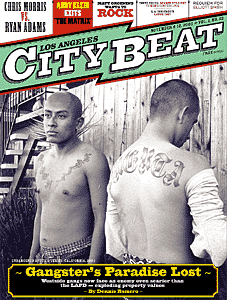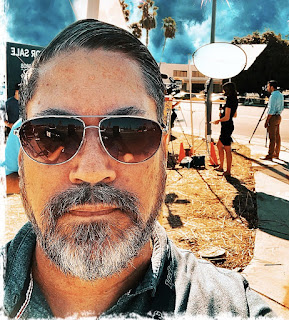Bio
Dennis Romero is a staff writer and news blogger for LA Weekly. In 2008 he wrapped up a three-year stint as the sole staff writer at Ciudad magazine, an upscale glossy from the folks behind Los Angeles magazine and Texas Monthly.
Romero was born and raised in San Diego. His father was the Mexico correspondent for the San Diego Tribune and later the Union-Tribune; the elder Romero went on to become an editor at the Los Angeles Times before returning to San Diego.
In 1989 Dennis Romero started stringing for the Los Angeles Times' Westside section, covering Santa Monica and Beverly Hills city council meetings. A few years later he became the New York Times "campus correspondent" at UCLA, where he earned a bachelor's degree in political science. In 1992, fresh off an internship at the Los Angeles Times, and while still in school, Romero became a frequent contributor to the paper's features and entertainment sections. On April 29, 1992, as the not-guilty verdicts in the Rodney King beating trial were announced, Romero happened to be in the Times' third-floor newsroom in downtown Los Angeles. As civil unrest erupted, he was dispatched to help cover some of the less-affected areas of town. For its coverage of the riots, the Times won the 1993 Pulitzer Prize for spot news reporting.
After graduating from UCLA in June, 1992, Romero took a job at the Philadelphia Inquirer as a features staff writer. In 1994, at the age of 24, Romero returned to the Times as a features and entertainment staff writer. He wrote mainly about youth and pop culture, discovering the street racers who would inspire the Fast and the Furious franchise, penning early features about rave culture, and writing about "cyber-hippies," female computer hackers and some of surfing's iconic characters.
In 1996 he was named as a finalist for the Lifestyle Journalism Awards for a piece he penned on surf-meets-the-streets fashion. In 1997 he was named to an elite committee of "senior journalists" at the Times. He worked at the paper until 1998, when he started freelancing for the New Times Los Angeles.
In 2000 Romero took a job as managing editor of webcaster and dance music news site grooveradio.com. In the early '00s he freelanced for the Los Angeles Times and LA Weekly. In 2003 he was asked to join the launch of LA CityBeat, a new alternative weekly newspaper, as "senior writer." At the paper he wrote about L.A.'s intractable skid row, Westside gangs that were becoming extinct as a result of gentrification, and a mayoral candidate who was wrongly being discounted as a threat to take the job - L.A. Mayor Antonio Villaraigosa.
In 2005, Emmis Publishing launched Ciudad magazine and asked Romero to be a staff writer. He joined a team that included editor-in-chief Oscar Garza, the former editor of the Los Angeles Times Magazine, and editorial director Angelo Figueroa, former editor of People en Espanol. In 2006 Romero received New America Media's highest honor, its Best In Depth award for a Ciudad feature about anti-immigrant Latinos.
He joined LA Weekly in late 2009.
Romero was born and raised in San Diego. His father was the Mexico correspondent for the San Diego Tribune and later the Union-Tribune; the elder Romero went on to become an editor at the Los Angeles Times before returning to San Diego.
In 1989 Dennis Romero started stringing for the Los Angeles Times' Westside section, covering Santa Monica and Beverly Hills city council meetings. A few years later he became the New York Times "campus correspondent" at UCLA, where he earned a bachelor's degree in political science. In 1992, fresh off an internship at the Los Angeles Times, and while still in school, Romero became a frequent contributor to the paper's features and entertainment sections. On April 29, 1992, as the not-guilty verdicts in the Rodney King beating trial were announced, Romero happened to be in the Times' third-floor newsroom in downtown Los Angeles. As civil unrest erupted, he was dispatched to help cover some of the less-affected areas of town. For its coverage of the riots, the Times won the 1993 Pulitzer Prize for spot news reporting.
After graduating from UCLA in June, 1992, Romero took a job at the Philadelphia Inquirer as a features staff writer. In 1994, at the age of 24, Romero returned to the Times as a features and entertainment staff writer. He wrote mainly about youth and pop culture, discovering the street racers who would inspire the Fast and the Furious franchise, penning early features about rave culture, and writing about "cyber-hippies," female computer hackers and some of surfing's iconic characters.
In 1996 he was named as a finalist for the Lifestyle Journalism Awards for a piece he penned on surf-meets-the-streets fashion. In 1997 he was named to an elite committee of "senior journalists" at the Times. He worked at the paper until 1998, when he started freelancing for the New Times Los Angeles.
In 2000 Romero took a job as managing editor of webcaster and dance music news site grooveradio.com. In the early '00s he freelanced for the Los Angeles Times and LA Weekly. In 2003 he was asked to join the launch of LA CityBeat, a new alternative weekly newspaper, as "senior writer." At the paper he wrote about L.A.'s intractable skid row, Westside gangs that were becoming extinct as a result of gentrification, and a mayoral candidate who was wrongly being discounted as a threat to take the job - L.A. Mayor Antonio Villaraigosa.
In 2005, Emmis Publishing launched Ciudad magazine and asked Romero to be a staff writer. He joined a team that included editor-in-chief Oscar Garza, the former editor of the Los Angeles Times Magazine, and editorial director Angelo Figueroa, former editor of People en Espanol. In 2006 Romero received New America Media's highest honor, its Best In Depth award for a Ciudad feature about anti-immigrant Latinos.
He joined LA Weekly in late 2009.



Comments